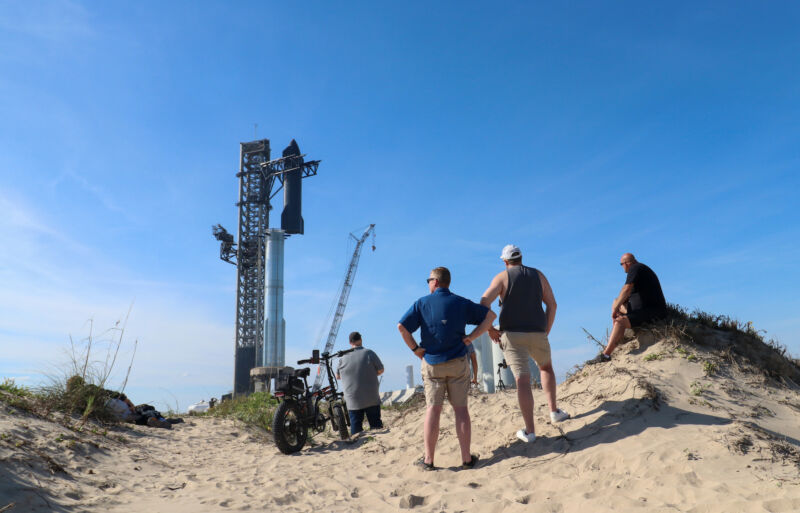SpaceX delays launch of its giant Starship rocket to swap out a part

BOCA CHICA BEACH, Texas—The launch of SpaceX’s second full-size Starship rocket from South Texas is now scheduled for Saturday, a day later than previously planned, according to company founder Elon Musk.
This 24-hour delay will allow time for SpaceX technicians at the company’s launch facility, known as Starbase, to replace a component on the rocket’s stainless steel Super Heavy booster. There is a 20-minute launch window on Saturday, opening at 7 am CST (13:00 UTC), shortly after sunrise in South Texas.
A delay at this point is unsurprising. Starship is a complex launch vehicle with a sum of 39 methane-burning engines, each producing roughly a half-million pounds of thrust, powering its booster stage and upper stage. And this is only the second test flight of SpaceX’s new full-scale, nearly 400-foot-tall (121-meter) rocket, the largest launch vehicle ever built.
No time wasted
What’s impressive, assuming SpaceX pulls off the repair in time for a launch attempt early Saturday, is this would be another example of the speed of progress at Starbase, located on a remote stretch of the Texas Gulf Coast east of Brownsville, just a few miles north of the US-Mexico border.
Within a few hours of making the decision to replace the part near the top of the Super Heavy booster stage, SpaceX’s ground crew detached the bullet-shaped Starship vehicle, itself some 15 stories tall, from the top of the rocket below. SpaceX uses the Starship name for both the upper stage of the rocket and the entire launch vehicle.
This is fairly standard work at SpaceX’s South Texas rocket base, where teams have lifted and lowered the Starship numerous times throughout previous tests and launch attempts. Two metallic arms, colloquially known as “chopsticks,” grabbed onto the sides of the Starship vehicle, raised it a few feet over the Super Heavy booster, then swung it to the side and lowered it to the ground.
The menacing structure towering over the coastal mud flats seemed to come alive, letting out creaks and groans as the two holding arms slowly descended rails running up and down the launch pad’s support tower. It took less than half-hour to remove the top third of the rocket and place it on the ground.
A few hundred yards away, a slew of shutter-happy spectators and SpaceX enthusiasts snapped pictures. They will have to wait at least an extra day to see this behemoth fly.
SpaceX needed to remove the Starship upper stage, numbered “Ship 25” in SpaceX parlance, to give technicians access to the part that needs replacing on the Super Heavy booster, designated “Booster 9.”
“We need to replace a grid fin actuator, so launch is postponed to Saturday,” Musk posted on his social media platform, X, on Thursday.
The Super Heavy booster has four of these grid fins, which work like small wings, at the top of the vehicle. They provide aerodynamic stability and some steering authority during the booster’s descent back to the ground. On this test flight, SpaceX aims to guide the booster back to a controlled rocket-assisted water landing in the Gulf of Mexico about 20 miles (32 kilometers) off the coast of Texas.
In the future, SpaceX wants to land the Super Heavy booster, larger than the fuselage of a Boeing 777 airliner, vertically back on its launch pad for rapid reuse. The Starship upper stage is also designed for recovery and reuse.
https://arstechnica.com/?p=1984487